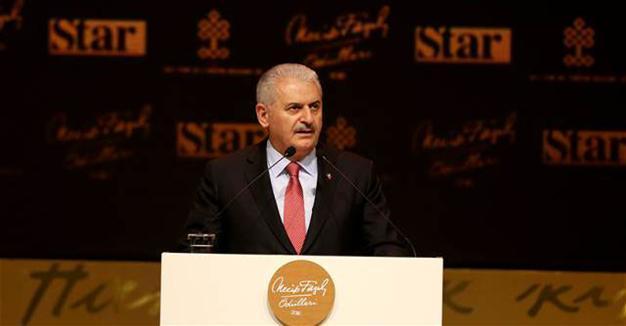Turkish, Iraq PMs discuss cooperation against terrorism
 Turkish Prime Minister Binali Yıldırım and Iraqi Prime Minister Haidar al-Abadi spoke on the phone on Dec. 10, during which they discussed deepening cooperation against terrorism.
Turkish Prime Minister Binali Yıldırım and Iraqi Prime Minister Haidar al-Abadi spoke on the phone on Dec. 10, during which they discussed deepening cooperation against terrorism.The two leaders agreed on the threat posed by both the Islamic State of Iraq and the Levant (ISIL) and the outlawed Kurdistan Workers’ Party (PKK), a statement issued by the Turkish Prime Ministry said on Dec. 10.
“Our prime minister [Yıldırım] has confirmed our country’s support for the fight against Daesh [ISIL] in Mosul and other regions conducted by Iraq,” read the statement, according to Doğan News Agency.
With the backing of the U.S.-led anti-ISIL coalition, Iraqi forces launched an offensive to liberate Mosul from the jihadists in October.
On Dec. 10, an Iraqi commander said reinforcements had been sent to eastern Mosul after a major ISIL counterattack drove troops back earlier in the week, the Associated Press reported. Iraqi forces have only captured a handful of eastern Mosul neighborhoods since launching the offensive.
Yıldırım also told the Iraqi prime minister that Turkey is confident that Iraq is taking the necessary steps against threats to Iraq’s security and welfare, particularly blocking new immigration waves in Tel Afar and Mosul.
Relations between Turkey and Iraq deteriorated after Turkey insisted that it will play a role in the battle to retake Mosul from ISIL, but Baghdad rejected the involvement and repeatedly called on Ankara to withdraw troops it had deployed at a camp in Bashiqa in northern Iraq.
On Nov. 10, Defense Minister Fikri Işık had told Iraqi Ambassador to Turkey Dr. Hisham al-Alawi that Turkish troops would no longer be needed at the Bashiqa camp in northern Iraq if the area’s security is maintained.
US defense chief in Iraq
Meanwhile, U.S. Defense Secretary Ashton Carter arrived in Iraq Dec. 11 to discuss the coming stages of the ongoing offensive to retake Mosul, AFP reported.
Carter had arrived in Baghdad and would “survey key locations directly supporting the battle for Mosul,” the Pentagon said in a statement.
The United States leads an international coalition providing assistance in the shape of air strikes, equipment, training and advising on the ground to Iraqi forces battling the jihadists.
U.S. forces are stationed in Qayyarah, the main staging base for the southern front of the Mosul offensive, as well as in the autonomous Kurdistan Region Government (KRG).
Around 5,000 U.S. troops are deployed in Iraq as part of an “advise and assist” mission to support Iraqi federal and Kurdish peshmerga forces battling jihadists.
U.S. special forces are also active on the ground in Iraq, as well as in neighboring Syria, where another offensive is under way to retake the other major remaining ISIL bastion of Raqqa.
Carter was set to meet with al-Abadi, KRG leader Massud Barzani and the commander of the U.S.-led coalition, Lieutenant General Steve Townsend.
Al-Abadi had promised that Mosul would be retaken by the end of 2016, but the going has been tough for Iraqi forces inside the densely populated city and commanders have warned the battle could go on for months.
In addition, the Spanish parliament is set to decide on whether to send an extra 125 soldiers to assist in the fight against ISIL in Iraq, where they have provided training to local troops, the Spanish Defense Ministry said on Dec. 9.
The extra troops would put the total number of Spanish forces in Iraq at 425 and would lend further logistical support in bomb detection. Spanish troops would not be taking part in any ground operations.
Spain’s parliament agreed unanimously to send 300 military personnel in 2014, when Prime Minister Mariano Rajoy’s conservative People’s Party (PP) had a majority in parliament.
He is now at the helm of a minority government, meaning that he will need support from opposition lawmakers in a highly fragmented lower house, though the second-place Socialist party voted in favor of sending troops two years ago.
It was not immediately clear when parliament would vote on the matter.
















